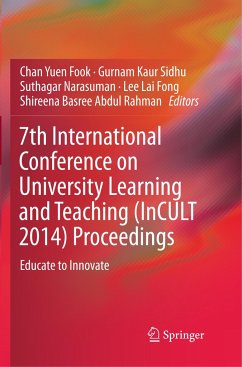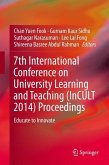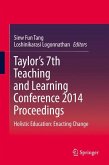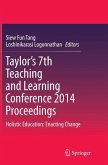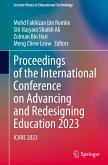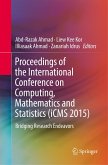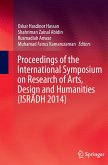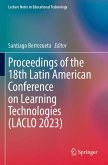7th International Conference on University Learning and Teaching (InCULT 2014) Proceedings
Educate to Innovate
Herausgegeben:Fook, Chan Yuen; Sidhu, Gurnam Kaur; Narasuman, Suthagar; Fong, Lee Lai; Abdul Rahman, Shireena Basree
7th International Conference on University Learning and Teaching (InCULT 2014) Proceedings
Educate to Innovate
Herausgegeben:Fook, Chan Yuen; Sidhu, Gurnam Kaur; Narasuman, Suthagar; Fong, Lee Lai; Abdul Rahman, Shireena Basree
- Broschiertes Buch
- Merkliste
- Auf die Merkliste
- Bewerten Bewerten
- Teilen
- Produkt teilen
- Produkterinnerung
- Produkterinnerung
The book comprises papers presented at the 7th International Conference on University Learning and Teaching (InCULT) 2014, which was hosted by the Asian Centre for Research on University Learning and Teaching (ACRULeT) located at the Faculty of Education, Universiti Teknologi MARA, Shah Alam, Malaysia. It was co-hosted by the University of Hertfordshire, UK; the University of South Australia; the University of Ohio, USA; Taylor's University, Malaysia and the Training Academy for Higher Education (AKEPT), Ministry of Education, Malaysia. A total of 165 papers were presented by speakers from…mehr
Andere Kunden interessierten sich auch für
![7th International Conference on University Learning and Teaching (InCULT 2014) Proceedings 7th International Conference on University Learning and Teaching (InCULT 2014) Proceedings]() 7th International Conference on University Learning and Teaching (InCULT 2014) Proceedings150,99 €
7th International Conference on University Learning and Teaching (InCULT 2014) Proceedings150,99 €![Taylor¿s 7th Teaching and Learning Conference 2014 Proceedings Taylor¿s 7th Teaching and Learning Conference 2014 Proceedings]() Taylor¿s 7th Teaching and Learning Conference 2014 Proceedings113,99 €
Taylor¿s 7th Teaching and Learning Conference 2014 Proceedings113,99 €![Taylor¿s 7th Teaching and Learning Conference 2014 Proceedings Taylor¿s 7th Teaching and Learning Conference 2014 Proceedings]() Taylor¿s 7th Teaching and Learning Conference 2014 Proceedings112,99 €
Taylor¿s 7th Teaching and Learning Conference 2014 Proceedings112,99 €![Proceedings of the International Conference on Advancing and Redesigning Education 2023 Proceedings of the International Conference on Advancing and Redesigning Education 2023]() Proceedings of the International Conference on Advancing and Redesigning Education 2023261,99 €
Proceedings of the International Conference on Advancing and Redesigning Education 2023261,99 €![Proceedings of the International Conference on Computing, Mathematics and Statistics (iCMS 2015) Proceedings of the International Conference on Computing, Mathematics and Statistics (iCMS 2015)]() Proceedings of the International Conference on Computing, Mathematics and Statistics (iCMS 2015)112,99 €
Proceedings of the International Conference on Computing, Mathematics and Statistics (iCMS 2015)112,99 €![Proceedings of the International Symposium on Research of Arts, Design and Humanities (ISRADH 2014) Proceedings of the International Symposium on Research of Arts, Design and Humanities (ISRADH 2014)]() Proceedings of the International Symposium on Research of Arts, Design and Humanities (ISRADH 2014)112,99 €
Proceedings of the International Symposium on Research of Arts, Design and Humanities (ISRADH 2014)112,99 €![Proceedings of the 18th Latin American Conference on Learning Technologies (LACLO 2023) Proceedings of the 18th Latin American Conference on Learning Technologies (LACLO 2023)]() Proceedings of the 18th Latin American Conference on Learning Technologies (LACLO 2023)171,99 €
Proceedings of the 18th Latin American Conference on Learning Technologies (LACLO 2023)171,99 €-
-
-
The book comprises papers presented at the 7th International Conference on University Learning and Teaching (InCULT) 2014, which was hosted by the Asian Centre for Research on University Learning and Teaching (ACRULeT) located at the Faculty of Education, Universiti Teknologi MARA, Shah Alam, Malaysia. It was co-hosted by the University of Hertfordshire, UK; the University of South Australia; the University of Ohio, USA; Taylor's University, Malaysia and the Training Academy for Higher Education (AKEPT), Ministry of Education, Malaysia. A total of 165 papers were presented by speakers from around the world based on the theme "Educate to Innovate in the 21st Century." The papers in this timely book cover the latest developments, issues and concerns in the field of teaching and learning and provide a valuable reference resource on university teaching and learning for lecturers, educators, researchers and policy makers.
Produktdetails
- Produktdetails
- Verlag: Springer / Springer Nature Singapore / Springer, Berlin
- Artikelnr. des Verlages: 978-981-13-5702-2
- Softcover reprint of the original 1st ed. 2016
- Seitenzahl: 888
- Erscheinungstermin: 9. Dezember 2018
- Englisch
- Abmessung: 235mm x 155mm x 48mm
- Gewicht: 1335g
- ISBN-13: 9789811357022
- ISBN-10: 9811357021
- Artikelnr.: 54800261
- Herstellerkennzeichnung Die Herstellerinformationen sind derzeit nicht verfügbar.
- Verlag: Springer / Springer Nature Singapore / Springer, Berlin
- Artikelnr. des Verlages: 978-981-13-5702-2
- Softcover reprint of the original 1st ed. 2016
- Seitenzahl: 888
- Erscheinungstermin: 9. Dezember 2018
- Englisch
- Abmessung: 235mm x 155mm x 48mm
- Gewicht: 1335g
- ISBN-13: 9789811357022
- ISBN-10: 9811357021
- Artikelnr.: 54800261
- Herstellerkennzeichnung Die Herstellerinformationen sind derzeit nicht verfügbar.
Chan Yuen Fook (PhD) is a Professor of teaching and learning and was a Fulbright Scholar at Indiana University (2010-2011). He is widely published and involved in research projects at both national and international levels. His areas of interest include Educational Assessment, and Educational Management and Leadership. Gurnam Kaur Sidhu (PhD) has been involved in education since 1979 and is a Professor of Teaching & Learning. Currently, the Director of the Asian Centre for Research on University Learning and Teaching (ACRULeT), her areas of interest include TESL, and Educational Management and Leadership. Suthagar Narasuman (PhD) has been in the teaching profession for the past 30 years. His areas of interest include Teaching English as a Second Language, Linguistics, Literature and Computer Assisted Language Learning. Lee Lai Fong (PhD) has 25 years of experience in Teaching English as a Second Language (TESL). Her areas of interest are ESL writing, grammar,teacher training and English for Specific Purposes. Shireena Basree Abdul Rahman (PhD) has been involved in the Teaching of English as a Second Language Program since 1997. Her research interests include the areas of literacy and literature in the ESL Classroom, pre-service teacher training in TESL and other related areas in English Language Teaching.
1 An analysis of the effect of demographic factors on the level of ICT integration.- 2 The relationship between learning culture and high performance and productivity culture with job satisfaction: A study among employees in one public organization in Sarawak, Malaysia.- 3 E-integral map: An innovative integral calculus learning.- 4 Science learners' conceptions on the scientific theory-law relationship: A phenomenographic case study.- 5 Attitude on microteaching: A study on third and fourth year science student teachers of the Faculty of Education, UiTM.- 6 Use of CAOS test in Introductory Statistics subject.- 7 Culturally responsive pedagogy: Experience in the visual art education classroom.- 8 Prevalence rate of dyscalculia according to gender and school location in Sabah, Malaysia.- 9 Perceived effectiveness of the Basic English curriculum: Vietnamese university graduates' perspectives.- 10 Assessment strategies to enhance learning in higher education.- 11 Learning fractions.- 12 Teaching complex theoretical subjects using digital game-based learning in the Faculty of Creative Industries, UTAR.- 13 Factor structure of Statistics Anxiety Rating Scale (STARS): EFA and CFA using Malaysian undergraduate psychology students.- 14 Learning Arabic language among diploma students in UiTM: A look at students' perspective.- 15 Exploring supervisors' perspectives to enhance postgraduate supervision.- 16 Understanding of diffusion, osmosis and particulate theory of matter conceptions among pre-service Biology teachers.- 17 Reorientation of knowledge among primary school teachers in adopting a transformed classroom assessment policy.- 18 Academic dishonesty among business students: Cheating acts and proposed ways to reduce cheating behavior.- 19 Confused, bored, excited? An emotion based approach to the design of online learning systems.- 20 The use of motivational strategies by ESL teachers in the National Defence University of Malaysia (NDUM).- 21 Application of Rasch Measurement Model in evaluating student performance for Foundation of Computing II.- 22 Language and content (subject matter) challenges experienced by Accountancy students in Law courses.- 23 Transfer of training and its relationship with reasons for participation and realization factors - A study of ICT training among teachers of a public secondary school in Malaysia.- 24 The impact of collaborative learning using Wikis among Japanese as a Foreign Language (JFL) learners of the tertiary level.- 25 Postgraduate students' engagement through critical literacy awareness.- 26 The impact of reflective inquiry on professional development of student teachers.- 27 Supervisors' written feedback on thesis writing: Postgraduate students' perspectives and concerns.- 28 Factors contributing to students' poor performance in a Mathematics Preparatory program.- 29 Enhancing Malaysian students' learning with interactive multimedia and the web: The MILE Project.- 30 Innovating learners through readings:Investigating ESL students' reading performance.- 31 Students' perceptions of using Project-based Learning: A case study of UiTM.- 32 Error in solving Mathematical word problem: A study of preparatory diploma program.- 33 Towards inclusive education in Malaysian universities: Addressing the barriers, challenges and needs of special educational needs learners.- 34 A multi-domain framework for modelling educational games: Towards the development of effective educational games.- 35 Usability testing for culturally-enhanced serious game.- 36 Organizational innovativeness as predictors to organizational performance of public universities in Malaysia.- 37 Excellent teachers' perceptions on the causes of disciplinary problems among secondary school students.- 38 A study on the interpersonal behaviors of trainee teachers with their students during teaching practicum.- 39 Enhancing e-learning using Smart Mobile English Learning Tool (SMELT).- 40 Does one size fit all? The academic writing needsof undergraduates across disciplines.- 41 Experiential learning in the wilderness: Outdoor education program toward enhancing college students' leadership practices.- 42 Teachers' perceptions on ethics when using social medias: A preliminary study.- 43 Using Class Blogs in improving lower secondary school students' motivation in understanding literature in Muar.- 44 Secondary school students' knowledge and awareness on environmental issues.- 45 A study on trainee teachers' locus of control: A case of Universiti Teknologi MARA.- 46 Science teachers' continuous professional development: A preliminary finding.- 47 Peer evaluation system in team work skills assessment.- 48 A preliminary study of a project-based learning into the electronic portfolio systems.- 49 Effectiveness of computerized homework implementation in Thermodynamics: Correlation between doing the homework and the grade.- 50 Academic dishonesty among business students: A descriptive study of plagiarism behavior.- 51 Innovating ESL listening instructions through the learners' perspectives on technology-enhanced blended learning.- 52 Investigating the needs for innovative online-based research practices in the ESL classrooms.- 53 Process Oriented Guided Inquiry Learning (POGIL) in Discrete Mathematics.- 54 A preliminary study on selected Malaysian millennial: Their characteristics and its implications on teaching innovation.- 55 A Romanised Mandarin Web-Based Instruction: Its economic potentials and acceptance levels of non-native Mandarin learners.- 56 MITRANS postgraduate research programs in Transport and Logistics: Program outcomes survey.- 57 Plagiarism in academic writing among TESL postgraduate students: A case study.- 58 "To cheat or not to cheat, that is the question": Undergraduates' moral reasoning and academic dishonesty.- 59 Exploring metacognitive strategies of ESL students during online listening assessment.- 60 Effectiveness of courseware presentation using learning theory for a programming subject.- 61 Student readiness of a newly-designed blended learning English language proficiency course in UiTM.- 62 Can technology make a difference for shy undergraduates?.- 63 "A" Maths Potential Program: A case study of Mathematical learning using technology-based approach.- 64 TPACK in VAE: A study on students' readiness to use e-learning using technology-based approach.- 65 An innovative decision making style strategy framework for sustainable leadership amongst deans of public universities.- 66 Because I'm happy: Investigating the effects of a social outreach project on happiness among ESL learners in a Malaysian private university.- 67 Nonverbal communication among Arab debaters in Malaysia.
1 An analysis of the effect of demographic factors on the level of ICT integration.- 2 The relationship between learning culture and high performance and productivity culture with job satisfaction: A study among employees in one public organization in Sarawak, Malaysia.- 3 E-integral map: An innovative integral calculus learning.- 4 Science learners' conceptions on the scientific theory-law relationship: A phenomenographic case study.- 5 Attitude on microteaching: A study on third and fourth year science student teachers of the Faculty of Education, UiTM.- 6 Use of CAOS test in Introductory Statistics subject.- 7 Culturally responsive pedagogy: Experience in the visual art education classroom.- 8 Prevalence rate of dyscalculia according to gender and school location in Sabah, Malaysia.- 9 Perceived effectiveness of the Basic English curriculum: Vietnamese university graduates' perspectives.- 10 Assessment strategies to enhance learning in higher education.- 11 Learning fractions.- 12 Teaching complex theoretical subjects using digital game-based learning in the Faculty of Creative Industries, UTAR.- 13 Factor structure of Statistics Anxiety Rating Scale (STARS): EFA and CFA using Malaysian undergraduate psychology students.- 14 Learning Arabic language among diploma students in UiTM: A look at students' perspective.- 15 Exploring supervisors' perspectives to enhance postgraduate supervision.- 16 Understanding of diffusion, osmosis and particulate theory of matter conceptions among pre-service Biology teachers.- 17 Reorientation of knowledge among primary school teachers in adopting a transformed classroom assessment policy.- 18 Academic dishonesty among business students: Cheating acts and proposed ways to reduce cheating behavior.- 19 Confused, bored, excited? An emotion based approach to the design of online learning systems.- 20 The use of motivational strategies by ESL teachers in the National Defence University of Malaysia (NDUM).- 21 Application of Rasch Measurement Model in evaluating student performance for Foundation of Computing II.- 22 Language and content (subject matter) challenges experienced by Accountancy students in Law courses.- 23 Transfer of training and its relationship with reasons for participation and realization factors - A study of ICT training among teachers of a public secondary school in Malaysia.- 24 The impact of collaborative learning using Wikis among Japanese as a Foreign Language (JFL) learners of the tertiary level.- 25 Postgraduate students' engagement through critical literacy awareness.- 26 The impact of reflective inquiry on professional development of student teachers.- 27 Supervisors' written feedback on thesis writing: Postgraduate students' perspectives and concerns.- 28 Factors contributing to students' poor performance in a Mathematics Preparatory program.- 29 Enhancing Malaysian students' learning with interactive multimedia and the web: The MILE Project.- 30 Innovating learners through readings:Investigating ESL students' reading performance.- 31 Students' perceptions of using Project-based Learning: A case study of UiTM.- 32 Error in solving Mathematical word problem: A study of preparatory diploma program.- 33 Towards inclusive education in Malaysian universities: Addressing the barriers, challenges and needs of special educational needs learners.- 34 A multi-domain framework for modelling educational games: Towards the development of effective educational games.- 35 Usability testing for culturally-enhanced serious game.- 36 Organizational innovativeness as predictors to organizational performance of public universities in Malaysia.- 37 Excellent teachers' perceptions on the causes of disciplinary problems among secondary school students.- 38 A study on the interpersonal behaviors of trainee teachers with their students during teaching practicum.- 39 Enhancing e-learning using Smart Mobile English Learning Tool (SMELT).- 40 Does one size fit all? The academic writing needsof undergraduates across disciplines.- 41 Experiential learning in the wilderness: Outdoor education program toward enhancing college students' leadership practices.- 42 Teachers' perceptions on ethics when using social medias: A preliminary study.- 43 Using Class Blogs in improving lower secondary school students' motivation in understanding literature in Muar.- 44 Secondary school students' knowledge and awareness on environmental issues.- 45 A study on trainee teachers' locus of control: A case of Universiti Teknologi MARA.- 46 Science teachers' continuous professional development: A preliminary finding.- 47 Peer evaluation system in team work skills assessment.- 48 A preliminary study of a project-based learning into the electronic portfolio systems.- 49 Effectiveness of computerized homework implementation in Thermodynamics: Correlation between doing the homework and the grade.- 50 Academic dishonesty among business students: A descriptive study of plagiarism behavior.- 51 Innovating ESL listening instructions through the learners' perspectives on technology-enhanced blended learning.- 52 Investigating the needs for innovative online-based research practices in the ESL classrooms.- 53 Process Oriented Guided Inquiry Learning (POGIL) in Discrete Mathematics.- 54 A preliminary study on selected Malaysian millennial: Their characteristics and its implications on teaching innovation.- 55 A Romanised Mandarin Web-Based Instruction: Its economic potentials and acceptance levels of non-native Mandarin learners.- 56 MITRANS postgraduate research programs in Transport and Logistics: Program outcomes survey.- 57 Plagiarism in academic writing among TESL postgraduate students: A case study.- 58 "To cheat or not to cheat, that is the question": Undergraduates' moral reasoning and academic dishonesty.- 59 Exploring metacognitive strategies of ESL students during online listening assessment.- 60 Effectiveness of courseware presentation using learning theory for a programming subject.- 61 Student readiness of a newly-designed blended learning English language proficiency course in UiTM.- 62 Can technology make a difference for shy undergraduates?.- 63 "A" Maths Potential Program: A case study of Mathematical learning using technology-based approach.- 64 TPACK in VAE: A study on students' readiness to use e-learning using technology-based approach.- 65 An innovative decision making style strategy framework for sustainable leadership amongst deans of public universities.- 66 Because I'm happy: Investigating the effects of a social outreach project on happiness among ESL learners in a Malaysian private university.- 67 Nonverbal communication among Arab debaters in Malaysia.

